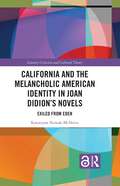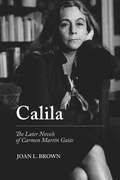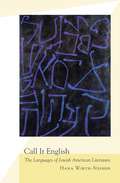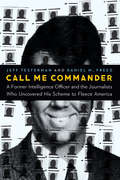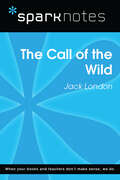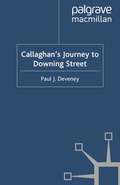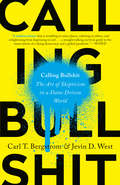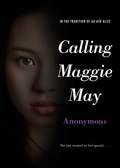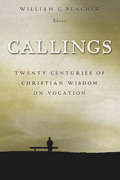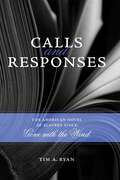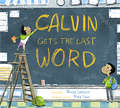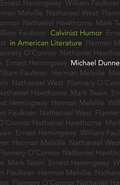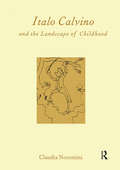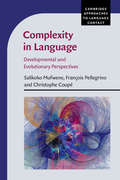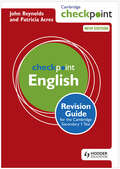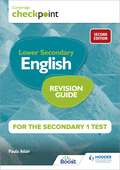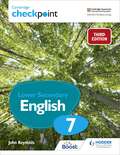- Table View
- List View
California Treasures, English Language Development, My New Words, A Picture Word Book, Grades K-2
by Macmillan Mcgraw-HillNIMAC-sourced textbook
California Vistas: Family and Friends
by Kevin P. Colleary Ed. D. Stephen F. Cunha James A. Bank Jana Echevarria [et al.]A language arts textbook
California and the Melancholic American Identity in Joan Didion’s Novels: Exiled from Eden (Literary Criticism and Cultural Theory)
by Katarzyna Nowak McNeiceCalifornia and the Melancholic American Identity in Joan Didion’s Novels: Exiled from Eden focuses on the concept of Californian identity in the fiction of Joan Didion. This identity is understood as melancholic, in the sense that the critics following the tradition of both Sigmund Freud and Walter Benjamin use the word. The book traces the progress of the way Californian identity is portrayed in Joan Didion’s novels, starting with the first two in which California plays the central role, Run River and Play It As It Lays, through A Book of Common Prayer to Democracy and The Last Thing He Wanted, where California functions only as a distant point of reference, receding to the background of Didion’s interests. Curiously enough, Didion presents Californian history as a history of white settlement, disregarding whole chapters of the history of the region in which the Californios and Native Americans, among other groups, played a crucial role: it is this reticence that the monograph sees as the main problem of Didion’s fiction and presents it as the silent center of gravity in Didion’s oeuvre. The monograph proposes to see the melancholy expressed by Didion’s fiction organized into four losses: of Nature, History, Ethics, and Language; around which the main analytical chapters are constructed. What remains unrepresented and silenced comes back to haunt Didion’s fiction, and it results in a melancholic portrayal of California and its identity – which is the central theme this monograph addresses.The Open Access version of this book, available at http://www.taylorfrancis.com, has been made available under a Creative Commons [Attribution-Non Commercial-No Derivatives (CC BY-NC-ND)] 4.0 license.
Calila: The Later Novels of Carmen Martín Gaite (Campos Ibéricos: Bucknell Studies in Iberian Literatures and Cultures)
by Joan L. BrownCalila: The Later Novels of Carmen Martín Gaite explores the last six novels by Spain´s most honored contemporary woman writer. Its scholarship is enriched by the voice of Calila herself—as Brown called Martín Gaite, who was a dear friend—as they conversed and exchanged letters during the composition of the novels. The book opens with an introduction to Martín Gaite´s life and literature and ends with a consideration of her legacy. Each central chapter analyzes a later novel in its historical, biographical, and critical contexts. From the young adult fantasy Caperucita en Manhattan (Red Riding Hood in Manhattan) to the post-Transition epistolary masterpiece Nubosidad variable (Variable Cloud), the Transition-era saga La Reina de las Nieves (The Farewell Angel), the Proustian reminiscence Lo raro es vivir (Living’s the Strange Thing), the narrative tapestry Irse de casa (Leaving Home), and the memoir of family secrets Los parentescos (Family Relations), these fascinating novels evoke themes that resonate today.
Call It English: The Languages of Jewish American Literature
by Hana Wirth-NesherCall It English identifies the distinctive voice of Jewish American literature by recovering the multilingual Jewish culture that Jews brought to the United States in their creative encounter with English. In transnational readings of works from the late-nineteenth century to the present by both immigrant and postimmigrant generations, Hana Wirth-Nesher traces the evolution of Yiddish and Hebrew in modern Jewish American prose writing through dialect and accent, cross-cultural translations, and bilingual wordplay. Call It English tells a story of preoccupation with pronunciation, diction, translation, the figurality of Hebrew letters, and the linguistic dimension of home and exile in a culture constituted of sacred, secular, familial, and ancestral languages. Through readings of works by Abraham Cahan, Mary Antin, Henry Roth, Delmore Schwartz, Bernard Malamud, Saul Bellow, Cynthia Ozick, Grace Paley, Philip Roth, Aryeh Lev Stollman, and other writers, it demonstrates how inventive literary strategies are sites of loss and gain, evasion and invention. The first part of the book examines immigrant writing that enacts the drama of acquiring and relinquishing language in an America marked by language debates, local color writing, and nativism. The second part addresses multilingual writing by native-born authors in response to Jewish America's postwar social transformation and to the Holocaust. A profound and eloquently written exploration of bilingual aesthetics and cross-cultural translation, Call It English resounds also with pertinence to other minority and ethnic literatures in the United States.
Call Me Commander: A Former Intelligence Officer and the Journalists Who Uncovered His Scheme to Fleece America
by Jeff Testerman Daniel M. FreedWhen Lt. Commander Bobby Thompson surfaced in Tampa in 1998, it was as if he had fallen from the sky, providing no hint of his past life. Eleven years later, St. Petersburg Times investigative reporter Jeff Testerman visited the rundown duplex Thompson used as his home and the epicenter of his sixty-thousand-member charity, the U.S. Navy Veterans Association. But something was amiss. Thompson&’s charity&’s addresses were just maildrops, his members nonexistent, and his past a black hole. Yet, somehow, the Commander had stood for photos with President George W. Bush, Senator John McCain, and other political luminaries. The USNVA, it turned out, was a phony charity where Thompson used pricey telemarketers, savvy lawyers, and political allies to swindle tens of millions from well-meaning donors. After Testerman&’s story revealed that the nonprofit was a sham, the Commander went on the run. U.S. Marshals took up the hunt in 2011 and found themselves searching for an unnamed identity thief who they likened to a real-life Jason Bourne. When finally captured in 2012, Thompson was carrying multiple IDs and a key to a locker that held nearly $1 million in cash. But, who was he? Eventually, investigators discovered he was John Donald Cody, a Harvard Law School graduate and former U.S. Army intelligence officer who had been wanted since the 1980s on theft charges and for questioning in an espionage probe. As Cody&’s decades as a fugitive came to an end, he claimed his charity was run at the behest of the Central Intelligence Agency. After reporting on the story for CNBC&’s American Greed in 2014, Daniel M. Freed dug into Cody&’s backstory—uncovering new information about his intelligence background and the evolution of his con. Watch a book trailer at callmecommander.net.
Call of the Wild (SparkNotes Literature Guide Series)
by SparkNotesCall of the Wild (SparkNotes Literature Guide) by Jack London Making the reading experience fun! Created by Harvard students for students everywhere, SparkNotes is a new breed of study guide: smarter, better, faster.Geared to what today's students need to know, SparkNotes provides:chapter-by-chapter analysis explanations of key themes, motifs, and symbols a review quiz and essay topicsLively and accessible, these guides are perfect for late-night studying and writing papers.
Callaghan's Journey to Downing Street
by P. DeveneyAn account of how one Labour Party politician, after suffering the biggest setback of his political career, used the anti-Vietnam War demonstrations in Grosvenor Square, the battle over trade union reform and the Troubles in Northern Ireland to propel himself to No 10.
Calling Bullshit: The Art of Skepticism in a Data-Driven World
by Carl T. Bergstrom Jevin D. WestBullshit isn&’t what it used to be. Now, two science professors give us the tools to dismantle misinformation and think clearly in a world of fake news and bad data. Misinformation, disinformation, and fake news abound and it&’s increasingly difficult to know what&’s true. Our media environment has become hyperpartisan. Science is conducted by press release. Startup culture elevates bullshit to high art. We are fairly well equipped to spot the sort of old-school bullshit that is based in fancy rhetoric and weasel words, but most of us don&’t feel qualified to challenge the avalanche of new-school bullshit presented in the language of math, science, or statistics. In Calling Bullshit, Professors Carl Bergstrom and Jevin West give us a set of powerful tools to cut through the most intimidating data. You don&’t need a lot of technical expertise to call out problems with data. Are the numbers or results too good or too dramatic to be true? Is the claim comparing like with like? Is it confirming your personal bias? Drawing on a deep well of expertise in statistics and computational biology, Bergstrom and West exuberantly unpack examples of selection bias and muddled data visualization, distinguish between correlation and causation, and examine the susceptibility of science to modern bullshit. We have always needed people who call bullshit when necessary, whether within a circle of friends, a community of scholars, or the citizenry of a nation. Now that bullshit has evolved, we need to relearn the art of skepticism.
Calling Maggie May (Anonymous Diaries)
by AnonymousA dark and edgy first-person cautionary tale about how one girl’s seemingly minor choices quickly spiraled into a life as a sex worker in the tradition of Go Ask Alice and Lucy in the Sky.She had a normal life, until one small decision changed everything. Suddenly, there were new possibilities and new experiences.But not all of those experiences were good.Read her shocking story in the diary she left behind.
Callings: Twenty Centuries of Christian Wisdom on Vocation
by William C. PlacherWhat am I going to do with my life? is a question that young people commonly face, while many not-so-young people continue to wonder about finding direction and purpose in their lives. Whether such purpose has to do with what job to take, whether to get married, or how to incorporate religious faith into the texture of their lives, Christians down the centuries have believed that God has plans for them. This unprecedented anthology gathers select passages on work and vocation from the greatest writers in Christian history. William Placher has written insightful introductions to accompany the selections — an introduction to each of the four main historical sections and a brief introduction to each reading. While the vocational questions faced by Christians have changed through the centuries, this book demonstrates how the distilled wisdom of these saints, preachers, theologians, and teachers remains relevant to Christians today. This rich resource is to be followed by a companion volume, edited by Mark R. Schwehn and Dorothy C. Bass, featuring texts drawn mainly from fiction, memoir, poetry, and other forms of literature. A study guide is available from Programs for the Theological Exploration of Vocation (PTEV) on their website: www.ptev.org
Calls and Responses: The American Novel of Slavery since Gone with the Wind (Southern Literary Studies)
by Tim A. RyanIn this comprehensive, groundbreaking study, Tim A. Ryan explores how American novelists since World War I have imagined the institution of slavery and the experience of those involved in it. Complicating the common assumption that authentic black-authored fiction about slavery is starkly opposed to the traditional, racist fiction (and history) created by whites, Ryan suggests that discourses about American slavery are -- and have always been -- defined by connections rather than disjunctions. Ryan contends that African American writers didn't merely reject and move beyond traditional portrayals of the black past but rather actively engaged in a dynamic dialogue with white-authored versions of slavery and existing historiographical debates. The result is an ongoing cultural conversation that transcends both racial and disciplinary boundaries and is akin to the call-and-response style of African American gospel music.Ryan addresses in detail more than a dozen major American novels of slavery, from the first significant modern fiction about the institution -- Margaret Mitchell's Gone with the Wind and Arna Bontemps's Black Thunder (both published in 1936) -- to recent noteworthy novels on the topic -- Edward P. Jones's The Known World and Valerie Martin's Property (both published in 2003). His insistence upon the necessity of interpreting novels about the past directly in relation to specific historical scholarship makes Calls and Responses especially compelling. He reads Toni Morrison's Beloved not in opposition to a monolithic orthodoxy about slavery but in relation to specific arguments of controversial historian Stanley Elkins. Similarly, he analyzes William Styron's The Confessions of Nat Turner in terms of its rhetorical echoes of Frederick Douglass's famous autobiographical narrative. Ryan shows throughout Calls and Responses how a variety of novelists -- including Alex Haley, Octavia Butler, Ishmael Reed, Margaret Walker, and Frances Gaither -- engage in a dynamic debate with each other and with such historians as Herbert Aptheker, Charles Joyner, Eugene and Elizabeth Genovese, and many others.A substantially new account of the development of American slavery fiction in the last century, Calls and Responses goes beyond merely exalting the expression of black voices and experiences and actually reconfigures the existing view of the American novel of slavery.
Calvin's Last Word
by Margo SorensonThe dictionary as narrator? YES! <P><P> Calvin's dictionary is proud to be carried everywhere Calvin goes--the breakfast table, school, baseball practice, and home again--because Calvin is determined to find the perfect word to attach to his annoying older brother. The word isn’t exactly revenge, mayhem, bewilderment, subterfuge, pulverize, or even retaliation, though all those words are so close and very tempting. When Calvin finally finds the right word for his rascally brother, his dictionary is surprised and delighted, and readers will enjoy celebrating the triumphant discovery of Calvin's perfect word along with his dictionary.
Calvinist Humor in American Literature
by Michael DunneThough the phrase "Calvinist humor" may seem to be an oxymoron, Michael Dunne, in highly original and unfailingly interesting readings of major American fiction writers, uncovers and traces two recurrent strands of Calvinist humor descending from Puritan times far into the twentieth century. Calvinist doctrine views mankind as fallen, apt to engage in any number of imperfect behaviors. Calvinist humor, Dunne explains, consists in the perception of this imperfection. When we perceive that only others are imperfect, we participate in the form of Calvinist humor preferred by William Bradford and Nathanael West. When we perceive that others are imperfect, as we all are, we participate in the form preferred by Mark Twain and William Faulkner, for example. Either by noting their characters' inferiority or by observing ways in which we are all far from perfect, Dunne observes, American writers have found much to laugh about and many occasions for Calvinist humor.The two strains of Calvinist humor are alike in making the faults of others more important than their virtues. They differ in terms of what we might think of as the writer/perceiver's disposition: his or her willingness to recognize the same faults in him- or herself. In addition to Bradford, West, Twain and Faulkner, Dunne discovers Calvinist humor in the works of Flannery O'Connor, Herman Melville, Nathaniel Hawthorne, Ernest Hemingway, and many others. For these authors, the world -- and thus their fiction -- is populated with flawed creatures. Even after belief in orthodox Calvinism diminished in the twentieth century, Dunne discovers, American writers continued to mine these veins, irrespective of the authors' religious affiliations -- or lack of them. Dunne notes that even when these writers fail to accept the Calvinist view wholeheartedly, they still have a tendency to see some version of Calvinism as more attractive than an optimistic, idealistic view of life.With an eye for the telling detail and a wry humor of his own, Dunne clearly demonstrates that the fundamental Calvinist assumption -- that human beings are fallen from some putatively better state -- has had a surprising, lingering presence in American literature.
Calvino and the Landscape of Childhood
by Claudia Nocentini (Lecturer in Italian, University of Edinburgh)"Although never named as such, the landscape of Sanremo was a visual source for Calvino's fiction. This recurring theme provides both a link between some very different works and an insight into the autobiographical dimension of an author whose attitude to privacy is protective but detached. This work is an analysis of the criteria of representative (and of representational distortion) of a descriptive motif."
Cambridge Approaches to Language Contact: Complexity in Language
by Salikoko Mufwene Christophe Coupé François PellegrinoThe question of complexity, as in what makes one language more 'complex' than another, is a long-established topic of debate amongst linguists. Recently, this issue has been complemented with the view that languages are complex adaptive systems, in which emergence and self-organization play major roles. However, few students of the phenomenon have gone beyond the basic assessment of the number of units and rules in a language (what has been characterized as 'bit complexity') or shown some familiarity with the science of complexity. This book reveals how much can be learned by overcoming these limitations, especially by adopting developmental and evolutionary perspectives. The contributors include specialists of language acquisition, evolution and ecology, grammaticization, phonology, and modeling, all of whom approach languages as dynamical, emergent, and adaptive complex systems.
Cambridge Approaches to Language Contact: Language Contact in Europe
by Bridget DrinkaThis comprehensive new work provides extensive evidence for the essential role of language contact as a primary trigger for change. Unique in breadth, it traces the spread of the periphrastic perfect across Europe over the last 2,500 years, illustrating at each stage the micro-responses of speakers and communities to macro-historical pressures. Among the key forces claimed to be responsible for normative innovations in both eastern and western Europe is 'roofing' - the superstratal influence of Greek and Latin on languages under the influence of Greek Orthodoxy and Roman Catholicism respectively. The author provides a new interpretation of the notion of 'sprachbund', presenting the model of a three-dimensional stratified convergence zone, and applies this model to her analysis of the have and be perfects within the Charlemagne sprachbund. The book also tackles broader theoretical issues, for example, demonstrating that the perfect tense should not be viewed as a universal category.
Cambridge Approaches to Language Contact: The Emergence of Hybrid Grammars
by Enoch Oladé AbohChildren are extremely gifted in acquiring their native languages, but languages nevertheless change over time. Why does this paradox exist? In this study of creole languages, Enoch Aboh addresses this question, arguing that language acquisition requires contact between different linguistic sub-systems that feed into the hybrid grammars that learners develop. There is no qualitative difference between a child learning their language in a multilingual environment and a child raised in a monolingual environment. In both situations, children learn to master multiple linguistic sub-systems that are in contact and may be combined to produce new variants. These new variants are part of the inputs for subsequent learners. Contributing to the debate on language acquisition and change, Aboh shows that language learning is always imperfect: learners' motivation is not to replicate the target language faithfully but to develop a system close enough to the target that guarantees successful communication and group membership.
Cambridge Approaches to Language Contact: The Making of Vernacular Singapore English
by Zhiming BaoSingapore English is a focal point across the many subfields of linguistics, as its semantic, syntactic and phonetic/phonological qualities tell us a great deal about what happens when very different types of language come together. Sociolinguists are also interested in the relative status of Singapore English compared to other languages in the country. This book charts the history of Singapore English and explores the linguistic, historical and social factors that have influenced the variety as it is spoken today. It identifies novel grammatical features of the language, discusses their structure and function, and traces their origins to the local languages of Singapore. It places grammatical system and usage at the core of analysis, and shows that introspective and corpus data are complementary. This study will be of interest to scholars and advanced students working on language contact, world varieties of English, historical linguistics and sociolinguistics.
Cambridge Checkpoint English Revision Guide for the Cambridge Secondary 1 Test
by John Reynolds Patricia AcresWith Checkpoint English Revision Guide for the Cambridge Secondary 1 test you can aim for the best grade with the help of relevant and accessible notes, examiner advice plus questions and answers on each key topic. - Clear explanations of every topic covered in the Cambridge Secondary 1 Checkpoint English syllabus - Builds revision skills you need for success in the test - Exam tips wirtten by test setters and examiners giving you their expert advice This text has not been through the Cambridge endorsement process.
Cambridge Checkpoint English Revision Guide for the Cambridge Secondary 1 Test
by John Reynolds Patricia AcresWith Checkpoint English Revision Guide for the Cambridge Secondary 1 test you can aim for the best grade with the help of relevant and accessible notes, examiner advice plus questions and answers on each key topic. - Clear explanations of every topic covered in the Cambridge Secondary 1 Checkpoint English syllabus - Builds revision skills you need for success in the test - Exam tips wirtten by test setters and examiners giving you their expert advice This text has not been through the Cambridge endorsement process.
Cambridge Checkpoint Lower Secondary English Revision Guide for the Secondary 1 Test 2nd edition
by Paula AdairAchieve maximum potential using step-by-step guidance that helps to practise skills learned and improve exam technique. - Build confidence with practical study tips and effective revision strategies. - Reinforce understanding with clear explanations of every topic covered in the Cambridge Lower Secondary Checkpoint English curriculum framework, including Spelling, Grammar and Vocabulary. - Strengthen and test knowledge using a range of poetry, fiction and non-fiction texts with related questions and worked examples. Answers to the practice test papers are available free online at www.hoddereducation.com/cambridgeextras
Cambridge Checkpoint Lower Secondary English Revision Guide for the Secondary 1 Test 2nd edition
by Paula AdairAchieve maximum potential using step-by-step guidance that helps to practise skills learned and improve exam technique. - Build confidence with practical study tips and effective revision strategies. - Reinforce understanding with clear explanations of every topic covered in the Cambridge Lower Secondary Checkpoint English curriculum framework, including Spelling, Grammar and Vocabulary. - Strengthen and test knowledge using a range of poetry, fiction and non-fiction texts with related questions and worked examples. Answers to the practice test papers are available free online at www.hoddereducation.com/cambridgeextras
Cambridge Checkpoint Lower Secondary English Student's Book 7: Third Edition
by John ReynoldsStage 7 has been endorsed by Cambridge Assessment International Education.Put your trust in a market-leading approach that has been used by teachers for over 10 years.Written by experienced author John Reynolds, Cambridge Checkpoint Lower Secondary English offers full coverage of the new Cambridge Lower Secondary English curriculum framework (0861). - Boost confidence and test understanding: Questions within the chapters will help consolidate learning, directing learners to pause and think about what they've read, written or discussed whilst exam-style questions will help develop confidence in preparation for Cambridge Lower Secondary Checkpoint.- Develop key concepts and skills: Information on the key skills such as grammar, punctuation, parts of speech and their functions, vocabulary and spelling is provided with linked exercises to practise these skills.- Engage learners and extend understanding: Cultivate a love of reading with diverse and wide-ranging texts to inspire learners on their reading journey, with carefully chosen discussion and reflection points for each topic.- Cater for all learners: With a series that has been written to ensure language is appropriate for learners from around the world.
Cambridge Checkpoint Lower Secondary English Student's Book 7: Third Edition
by John ReynoldsStage 7 has been endorsed by Cambridge Assessment International Education.Put your trust in a market-leading approach that has been used by teachers for over 10 years.Written by experienced author John Reynolds, Cambridge Checkpoint Lower Secondary English offers full coverage of the new Cambridge Lower Secondary English curriculum framework (0861). - Boost confidence and test understanding: Questions within the chapters will help consolidate learning, directing learners to pause and think about what they've read, written or discussed whilst exam-style questions will help develop confidence in preparation for Cambridge Lower Secondary Checkpoint.- Develop key concepts and skills: Information on the key skills such as grammar, punctuation, parts of speech and their functions, vocabulary and spelling is provided with linked exercises to practise these skills.- Engage learners and extend understanding: Cultivate a love of reading with diverse and wide-ranging texts to inspire learners on their reading journey, with carefully chosen discussion and reflection points for each topic.- Cater for all learners: With a series that has been written to ensure language is appropriate for learners from around the world.

